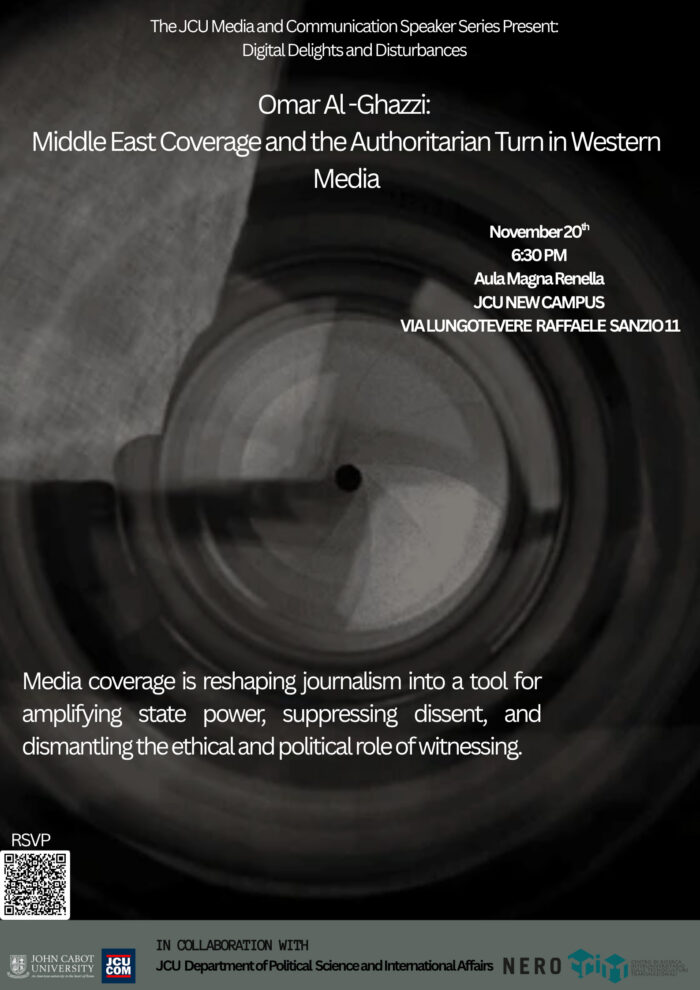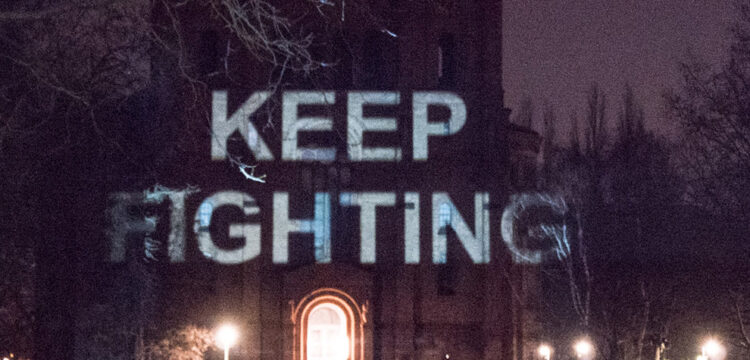The Authoritarian Turn
Middle East Coverage and the Authoritarian Turn in Western Media
This talk examines the effects of Western coverage of the Middle East. Taking the BBC as a prime example, it argues that Middle East coverage is characterised by a strategic orchestration of noise and silence that determines what context, words, labels, and historic legacies are used to tell stories about the region, and whose lives and bodies are deemed human. In addition to enabling genocide in Gaza, this Western media coverage is reshaping journalism into a tool for amplifying state power, suppressing dissent, and dismantling the role of witnessing as a rhetorical moral and political disposition. This transformation aligns the Western media system more closely with those in authoritarian contexts, such as the Arab world.
Dr Omar Al-Ghazzi is Associate Professor in the Department of Media and Communications at LSE, where he also serves as Deputy Head of Department (Education). He works on the geopolitics of global communications, particularly in relation to news media and popular culture. He is interested in the politics that shape the ways we talk about and use communications technologies, as well as the role of media in forging our imaginaries of the past and the future. He is currently completing a book on the politics of history in Arab media with Oxford University Press. Al-Ghazzi is an editor in the Middle East Journal of Culture and Communication.
Join us for this Fall fourth and final talk of the Digital Delights & Disturbances series on Thursday, November 20 at 6:30pm in Aula Magna Renella, New Campus organized and supported by the Department of Communication and Media Studies at John Cabot University, offered in collaboration with the Department of Political Science and International Affairs.
Digital Delights & Disturbances (DDD) offers radical ways to think out-of-the-(digital)-box we live in, imaginative and informed food for thought to feed our souls lost in the digital mayhem. DDD is organized and sponsored by the Department of Communication and Media Studies at John Cabot University, in collaboration with NERO and CRITT (Centro Culture Transnazionali).
Make sure to RSVP by noon on the day of the event at this link. More info at [email protected].
You say Western media coverage is re-shaping journalism into “a tool for amplifying state power.” Does this implicate that this wasn’t the case before? So how did that escalate?
Omar Al-Ghazzi: I think we must understand the coverage of the Middle East within a larger global media environment. Under the administration of US President Donald Trump, we hear regular attacks on media as the enemy of the people and as institutions of fake news. In relation to media, what we hear from the White House is not very different from what we are used to hearing from the Kremlin. At the same time, in Gaza, the number of Palestinian journalists killed by Israel has been unprecedented in contemporary warfare—estimated by Al-Jazeera English to be more than 250. In terms of Western coverage of the Middle East, many North American and European outlets cling to official Western and Israeli sources and narratives and silence Palestinian perspectives. The tone and language of these media outlets have suspended journalistic norms of truth and public service – further eroding the democratic and watchdog function of journalism. And so, as media enabled extreme violence against civilians in Gaza, it also further eroded the independence and truth telling function of journalism at home in a trend that is becoming difficult to reverse. This is why I use the term “authoritarian turn.”
Indeed, after October 7th it became impossible to watch mainstream media news outlets, for the blatant fabrication of lies, strategic omissions, and very arbitrary choices on terminology. Could you name some of the more poignant examples? And is there a code behind this kind of journalism (or it is just corruption)?
In authoritarian states, from Russia to China to the Arab world, the most effective and common mechanism to silence dissent is through accusations of posing a security threat or of terrorism. This trend of silencing truth and alternative perspectives by way of securitising public discourse has been exacerbated in Western coverage of Gaza. To invoke the word “terrorism” within the conventional bounds of liberal discourse, as Somayajula writes, “is to bring the debate to a screeching halt… There is no spectrum of acceptable opinions, no room for reasonable disagreement when it comes to terrorism. There are only two sides—those who are with the terrorists, and those who are against them.” In Israeli official communications, we see the endpoint of this such that all Palestinians regardless of status and age are deemed either terrorists or suspected terrorists. This includes Palestinian doctors, nurses, emergency responders, educators, and journalists.
In terms of how and why this happens, there is no code, or unique type of corruption per se, but an aggressive top-down push for media to comply with supportive messaging on Israel and an application of pressure that is felt and internalised by many journalists.

And how can all this be countered both from the side of the readers and of the producers?
This is countered first through acknowledgement that media coverage has enabled war crimes and that it is contributing to the erosion of freedoms at home and abroad, and second through collective mobilisation to tap into the courage needed to protect democracy, civil rights, and human rights.
How does this align Western authoritarian powers with those in the Arab world?
When one critiques Western media, it seems as if they are defending other media systems. However, what we are seeing is more convergence in global media culture and practice into a place of authoritarian control. So, I would argue that Western media are becoming more similar in their practices, conventions, and power structures to their counterparts in authoritarian media systems, such as in Russia or in the Arab world. The suspension of journalistic norms in relation to the Middle East played an important role in normalising that authoritarian turn.




